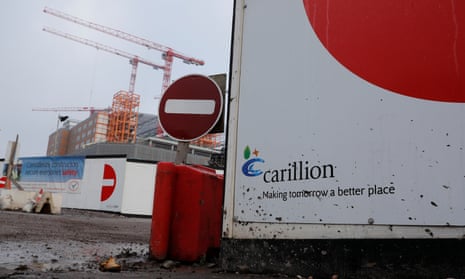Fears are growing that construction group Carillion, which also runs vital services for schools, the army and the NHS, is on the verge of collapse as it struggled to win approval from lenders for a financial rescue plan.
Accountancy firm EY has been lined up to manage a potential administration, while the Cabinet Office on Friday hosted emergency talks with the Pensions Regulator about the company’s 28,000-member pension scheme, which has a £580m deficit.
Labour called on the government to be ready to take the debt-laden company’s contracts back under state control but trade unions warned Carillion must not be offered a “blank cheque” bailout.
Carillion insisted late on Friday that it still hopes to reach a rescue deal, although the government said it has contingency plans in place, after ministers from several departments held crisis talks on Thursday.
Shares in Wolverhampton-based Carillion – which employs 43,000 people and can trace its roots back 200 years – fell a further 29% on fears of its collapse, meaning its value has crumbled by 94% in just twelve months from more than £1bn to just £61m.
The firm – built out of the old Tarmac construction business, which then acquired firms like Mowlem and Alfred McAlpine – is a major supplier to the government. It derived £1.7bn – a third of its 2016 revenue – from contracts across education, the NHS and the rail industry, including the £56bn HS2 project.
It won key government contracts as recently as November, despite having been in turmoil since unveiling a £1.15bn half-year loss in July that saw chief executive Richard Howson quit.
The loss, which sparked the first of three profit warnings, was blamed on an £845m hit taken on contracts that were rendered unprofitable by rising labour and raw material costs.
The downturn has left the business facing a £900m debt pile that dwarfs the value of the company, forcing it to go cap in hand to lenders in the hope of agreeing a restructuring of its finances.
But HSBC, Barclays, Santander and Royal Bank of Scotland reportedly knocked back plans presented by Carillion on Wednesday, on the grounds that they do not offer a viable future for the company.
In a statement, Carillion said it hopes to reach an agreement that would see lenders swap their debt for a stake in the company, all but wiping out existing shareholders. It is also seeking short-term loans while talks continue.
“Suggestions that the plan has been rejected or that talks have terminated are incorrect,” it said.
“When we have an update on those discussions, an announcement will be made in due course, as and when appropriate.”
Carillion is also under investigation by City watchdog the Financial Conduct Authority over the “timeliness and content” of announcements to the stock market between December 2016 and July last year.
Q&AWhat government contracts did Carillion hold?
Show
NHS
• Managed facilities including 200 operating theatres and 11,800 beds
• Made more than 18,500 patient meals per day
• Helpdesks dealt with 1.5m calls per year
• Engineering teams carrying out maintenance work
Transport
• Built 'smart motorways' – which ease congestion by monitoring traffic and adjusting lanes or speed limits – for the Highways Agency
• Major contractor on £56bn HS2 high-speed rail project
• Upgraded track and power lines for Network Rail
• Major contractor on London’s Crossrail project
• Roadbuilding and bridges
Defence
• Managed infrastructure and 50,000 homes for Ministry of Defence
Education
• Designed and built 150 schools
• Catering and cleaning contracts at 875 schools
Prisons
• Maintenance and repairs at about half of UK prisons
Libraries
• Managed several public libraries in England
Energy
• Built substations, overhead cables and other works for National Grid
The shadow business secretary, Rebecca Long-Bailey, said: “The collapse of Carillion could provoke a serious crisis. It would have major implications for the outsourced government contracts the company holds, as well as the firm’s thousands of workers, those in the supply chain and those who rely on Carillion’s pension fund.
“The government, who, despite warnings carried on with its programme of outsourcing public services to this company, must stand ready to bring these contracts back into public control, stabilise the situation and safeguard our public services.”
As executives held talks with the Cabinet Office and The Pensions Regulator aimed at preventing its demise and protecting pensioners, trade unions called on the government to prioritise its 19,500-strong UK workforce above a bailout for the company.
“First and foremost, workers’ jobs must be protected,” said GMB national secretary Rehana Azam.
“Handing Carillion bosses a blank cheque bail out is completely unacceptable – company bosses should not be rewarded for failure with public money.
“This is a company with an abysmal track record when it comes to protecting workers.
“We need an urgent task force, including employers and trade unions, to rescue this vital work from the inadequate grip of Carillion management.
“Government needs to urgently consider a public sector vehicle for taking on this vital work, just as it has when private rail companies have walked away and failed the taxpayer.”
Mick Cash, general secretary of the Rail, Maritime and Transport (RMT) union, said Carillion’s woes were evidence of “the high-risk gamble you take with handing infrastructure over to speculative private companies”.
The government has said contingency plans are in place to manage contracts held by Carillion.“The company has kept us informed of the steps it is taking to restructure the business,” it said.
A spokesman for the Pensions Regulator said: “We have been and remain closely involved in discussions with Carillion and the trustees of the pension schemes as this situation has unfolded.”

Comments (…)
Sign in or create your Guardian account to join the discussion